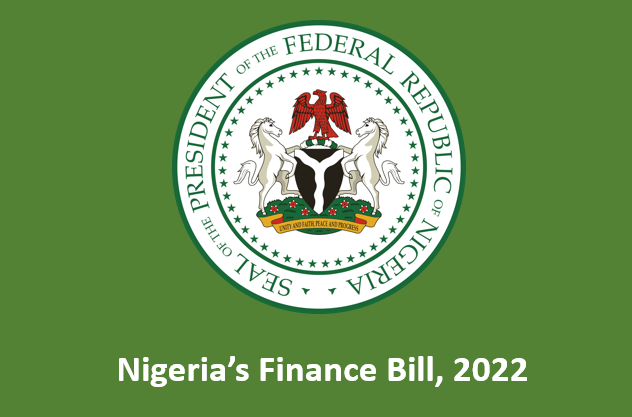Key Highlights Of The Finance Bill, 2022. By ATER, Solomon Vendaga
Since 2019, the annual budgets have been accompanied by Finance Acts which will set a tone for the proper actualization of what the budget dictates. The Finance Acts notably, introduce changes to the tax laws as such the 2022 Finance Bill is not an exception. The Bill is set to amend the provisions of the following tax laws;
Capital Gains Tax Act (CGTA)
Companies Income Tax Act (CITA)
Customs, Excise Tariff, Etc (Consolidation) Act
Personal Income Tax Act (PITA)
Petroleum Profits Tax Act (PPTA)
Stamp Duties Act (SDA)
Value Added Tax Act (VATA)
Corrupt Practices and Other Related Offences Act
Public Procurement Act
KEY HIGHLIGHTS OF THE BILL
All services including but not limited to telecommunication services provided in Nigeria will be subject to excise duties.
The Minister of Finance, Budget, and Economic Planning is to be charged with the responsibility for the supervision of the Tariff Review Board.
Taxation of digital assets under Capital Gains Tax at the rate of 10%.
The Bill will also amend the provisions of PPT to align with Petroleum Industry Act.
Taxation of Gambling and Gaming will be considered under Companies Income Tax Act.
The Bill has in line with the climate change policy of the country seek to increase the CIT for Companies that involved in gas-flaring from 30%-50%. The aim is to deter, gas emissions.
Specific entities like oil and gas Companies appointed or assigned to deduct VAT at source on invoices received from their vendors will now be required to remit that to FIRS on or before the 14th day of the following month as against the current 21st day.
According to the Bill the 10% investment allowance on qualifying expenditures will no longer apply.
The rollover relief will apply to an investor in an event that he reinvests the proceeds sold. This is an innovation in the Bill. Usually, 10% is charged on the gains from the sale.
The Bill also seeks to repeal the following;
The rural investment allowance ranging from 15% to 100% of cost incurred by a company to provide facilities such as electricity, water and tarred road where such facilities have not been provided by the government within 20 km of the location.
The partial tax exemption from CIT granted on income in convertible currencies derived from tourists by a hotel.
A public officer is required to seek administrative approvals and ensure there is an approved procurement plan in addition to existing requirements for the award or signing of contracts. Failure to comply is liable to 3 years imprisonment and a fine of N100,000 on conviction.
Interestingly, the Bill proposed amendment to the sharing formula for revenue from Electronic Money Transfer from the current 15% for FG and 85% for States to 15% for FG, 50% for States and 35% for LGs.
CONCLUSION
The Finance Bill, 2022 when passed into law has with it enormous innovations to make certain the economic environment for the actualization of the 2023 Budget. Most importantly, it will draw closer the practice of taxation to reflect current trends such as digital taxation.
REFERENCES
****************************************************************************************
This work is published under the free legal awareness project of Sabi Law Foundation (www.SabiLaw.org) funded by the law firm of Bezaleel Chambers International (www.BezaleelChambers.com). The writer was not paid or charged any publishing fee. You too can support the legal awareness projects and programs of Sabi Law Foundation by donating to us. Donate here and get our unique appreciation certificate or memento.
DISCLAIMER:
This publication is not a piece of legal advice. The opinion expressed in this publication is that of the author(s) and not necessarily the opinion of our organisation, staff and partners.
PROJECTS:
🛒 Take short courses, get samples/precedents and learn your rights at www.SabiLaw.org
🎯 Publish your legal articles for FREE by sending to: eve@sabilaw.org
🎁 Receive our free Daily Law Tips & other publications via our website and social media accounts or join our free whatsapp group: Daily Law Tips Group 6
KEEP IN TOUCH:
Get updates on all the free legal awareness projects of Sabi Law (#SabiLaw) and its partners, via:
YouTube: SabiLaw
Twitter: @Sabi_Law
Facebook page: SabiLaw
Instagram: @SabiLaw.org_
WhatsApp Group: Free Daily Law Tips Group 6
Telegram Group: Free Daily Law Tips Group
Facebook group: SabiLaw
Email: lisa@sabilaw.org
Website: www.SabiLaw.org
ABOUT US & OUR PARTNERS:
This publication is the initiative of the Sabi Law Foundation (www.SabiLaw.org) funded by the law firm of Bezaleel Chambers International (www.BezaleelChambers.com). Sabi Law Foundation is a Not-For-Profit and Non-Governmental Legal Awareness Organization based in Nigeria. It is the first of its kind and has been promoting free legal awareness since 2010.
DONATION & SPONSORSHIP:
As a registered not-for-profit and non-governmental organisation, Sabi Law Foundation relies on donations and sponsorships to promote free legal awareness across Nigeria and the world. With a vast followership across the globe, your donations will assist us to increase legal awareness, improve access to justice, reduce common legal disputes and crimes in Nigeria. Make your donations to us here or contact us for sponsorship and partnership, via: lisa@SabiLaw.org or +234 903 913 1200.
**********************************************************************************




















































